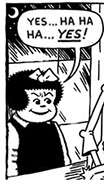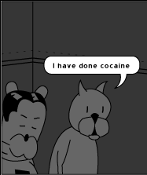|
All of this really sidesteps the real dilemma in that what makes randomness better is making misses interesting. It's a problem in D&D and it sounds like it's a problem in XCOM sequels; missing is either boring or an utter failure state and neither of those things is fun. If an attack roll is a chance to have fun then it's a lovely mechanic.
|
|
|
|

|
| # ? May 25, 2024 15:01 |
|
Also, the two things that are being multiplied there (probability x consequences) are not interchangeable in terms of the effect they have on the player's decision making. There's a distinction between planning and risk assessment, although they're closely related. Very small or very large probabilities have the smaller effect on your ability to determine what will happen this turn. This has an effect on your ability to plan in the first place, which the Both probability and consequences are important with respect to deciding which plan is best. But if you're faced with a bunch of 50% probabilities, planning is almost impossible. If you're faced with extremely bad consequences but extremely reliable odds, then yeah, failure really sucks, but you can more or less rely on your ability to cover for it. (And of course, if you remove luck from the picture completely, then you can plan indefinitely -- or, realistically speaking, to the limits of your personal ability to plan -- and it becomes a very different kind of game.) e: edited to be more clear in relation to my next post Tuxedo Catfish fucked around with this message at 01:47 on Jul 14, 2018 |
|
|
|
Jeb Bush 2012 posted:You still face the same basic issue: if you want misses to introduce fuzziness, the consequence of misses will need to be bigger the less likely they are. Sort of, but there's a wrinkle to this. The desirable amount of fuzziness isn't based on how good or bad the game state is for the player next turn. It's based on how much information they have about it. The scope of the consequences matters, but the positivity/negativity, not so much. On the other hand the positivity or negativity is very important for how frustrated the player gets. And how good or bad things look for the player can be altered by introducing more enemies or introducing a time limit or just about anything else you could think of.
|
|
|
|
When I want to sell people on 4E I mention how I turned around on it when I started to realize it was as close to a shining Force Tabletop RPG as I was ever going to get. Then I get blank looks because apparently nobody I talk has even so much as glanced at one of the Genesis collections floating around on every console made since early 2000.
|
|
|
|
Or put another way, there are two things that frustrate the player: 1. losing 2. feeling like their decisions don't matter And degree of randomness always affects #2, but changes to the consequences of failure don't always affect #1. I'm probably injecting a lot of personal bias when I say that I hate feeling like my decisions don't matter way more than I hate losing (and I already hate losing a lot  ) but naturally I also think that's a reasonable assumption to build games around. ) but naturally I also think that's a reasonable assumption to build games around.
|
|
|
|
gradenko_2000 posted:I would absolutely be down to explore a ruleset where attacks always hit, and the variance is in damage and the limited-use abilities that modify damage and force misses That was one of the central ideas of a heartbreaker I was working on a while back because I've whiffed on enough attack rolls for one lifetime and doing something is better than nothing. After fiddling around with the math on it, I'm a proponent of Death to Attack Rolls even if I don't know the best way to implement it. Getting rid of attack rolls gets rid of half the rolls that most characters will make during the average round, and those are the rolls that produce the most delays because every single +1 or -1 matters and searching for circumstantial modifiers is effectively free. The rules shouldn't incentivize spending five minutes finding out that half-halfling dildocrafters have a +1 to hit gnolls during Lent. I can't really blame players for trying to pass the "Does my round mean anything at all?" roll, but I can certainly blame the rules for making them care.
|
|
|
|
remusclaw posted:When I want to sell people on 4E I mention how I turned around on it when I started to realize it was as close to a shining Force Tabletop RPG as I was ever going to get. Then I get blank looks because apparently nobody I talk has even so much as glanced at one of the Genesis collections floating around on every console made since early 2000. Fool of sound isn't wrong when he says that Fire Emblem is probably the biggest name in turn-based tactics RPGs nowadays but I don't know if I'd pitch 4E as a tabletop Fire Emblem, personally.
|
|
|
|
Wrestlepig posted:How are you handling the GMing side? I like the system but the gm's guide and bestiary aren't out yet so I'd be a little lost. Are you running off the backwards compatibility from older editions, and how do you handle enemies? My GMing situation is kind of weird. For starters, it's a two-player game between my wife and I that we're effectively co-GMing. I'm also a pretty deep Gloranthaphile (and my wife is no slouch), so dealing with the setting has com pretty naturally. On the other hand, this is the first campaign I've ever GMed, the second I've played in, and my first time GMing Runequest. So I can't say for sure if my experience will be much help. Keeping all that in mind, I've found the game pretty manageable to GM. It hasn't been a terribly combat focused campaign, and I've been able to handle what combat there was fairly easily. The fairly unified combat and character mechanics means that pretty much everything you learn applies to every character, which is nice. My main complaint at this point is that the technical writing in the corebook is kind of flaky in places (particularly the dual-wielding rules). In terms of resources... at this point I've played through the free quickstart adventure twice – once as one-shot and once when I integrated it into my current campaign – and can vouch for it's quality. Next, there's the two Bestiary Previews, and GM Guide Preview. Finally there's a whole mess of old RQ2 material that's very cross-compatible (RQG has a conversion guide in an appendix), including a free bare-bones bestiary. There's also the whole huge back-catalog of Glorantha sourcebooks and campaigns if you want setting info or adventure hooks.
|
|
|
|
All this talk of killing attack rolls makes me think of Into The Breach, and makes me wonder if a highly deterministic game like that could be translated into a tactical tRPG.
|
|
|
|
Haystack posted:My GMing situation is kind of weird. For starters, it's a two-player game between my wife and I that we're effectively co-GMing. I'm also a pretty deep Gloranthaphile (and my wife is no slouch), so dealing with the setting has com pretty naturally. On the other hand, this is the first campaign I've ever GMed, the second I've played in, and my first time GMing Runequest. So I can't say for sure if my experience will be much help. It's nice to know the old stuff is actually convertible. Most of the preview stuff I saw seemed to have an ulterior motive for going out: the bestiary preview is all good player races and common companions, and the GM's guide is mostly errata. I'm familiar with the setting so that isn't an issue. My main concern is balanced encounters: I can't really tell what's appropriate to throw at the pcs.
|
|
|
|
I'm looking to start a new play-by-email. What's a game system that a) contains enough abstraction that a combat round *could* be one minute long and b) has a solid amount of trad crunch such the GM can roll the dice and adjudicate everything without a whole pile of back and forth for every little thing PbtA style, and c) isn't The One Ring RPG? Bonus points if it can support Planescape out of the box. I'm kind of thinking I might want AD&D 2e, for perhaps the first time in my life.
|
|
|
|
Wrestlepig posted:It's nice to know the old stuff is actually convertible. Most of the preview stuff I saw seemed to have an ulterior motive for going out: the bestiary preview is all good player races and common companions, and the GM's guide is mostly errata. I'm familiar with the setting so that isn't an issue. My main concern is balanced encounters: I can't really tell what's appropriate to throw at the pcs. Yeah, the combination of incredibly dangerous combat and universal healing makes for a weird dynamic. I'm taking things cautiously at the moment and have outright ruled that none of the PCs are dying without a really good narrative reason. They can get knocked out, maimed, ransomed, all that good stuff, but outright death is off the table.
|
|
|
|
Haystack posted:All this talk of killing attack rolls makes me think of Into The Breach, and makes me wonder if a highly deterministic game like that could be translated into a tactical tRPG. No reason it couldn't. The main problem is it really points a laser focus at encounter balance. Randomness tends to add novelty -- it's not strategically interesting to occasionally lose an easy encounter through no error of your own or to win a seemingly impossible one with a lucky streak, but it can be narratively interesting. Without that, the strategic experience is very "pure," but you're on the hook to deliver a fight that your players could win or lose based entirely on their decisions every combat, and they're on the hook to perform their best. It's not that different from how a game like 4E works, but it exposes the workings and might ruin some beneficial illusions.
|
|
|
|
Tuxedo Catfish posted:No reason it couldn't. The main problem is it really points a laser focus at encounter balance. To springboard off this, Into the Breach is even more "combat as a puzzle" than 4E. It works quite nicely, but it means that encounter creation would also be more akin to puzzle creation than the usual tactical combat that most games employ.
|
|
|
|
Haystack posted:Yeah, the combination of incredibly dangerous combat and universal healing makes for a weird dynamic. I'm taking things cautiously at the moment and have outright ruled that none of the PCs are dying without a really good narrative reason. They can get knocked out, maimed, ransomed, all that good stuff, but outright death is off the table. I really agree. When I wrote the fatal and friends writeup combat lethality was one of my biggest annoyances and a lot of my criticisms were based on mitigating it. There's all the talk about how combat should always be a risk but there's way better ways of doing that, especially when it's the most important part of the game and it's easy to gently caress up by thinking basic elves are a good opponent or something. For all the talk about maximum game fun or being Heroes it goes out the window pretty fast when swords are drawn. E: As a followup I just checked the maths and a swordsman with 100% combat skill has approximately a one in a thousand chance of probably killing themselves every attack. That seems like a lot, but it adds up, and when you consider how many people play the game there's going to be a lot of people not having maximum game fun. Never have Critical Misses in your game. Wrestlepig fucked around with this message at 04:31 on Jul 14, 2018 |
|
|
|
hyphz posted:It's basically the GM fudging rolls. I don't think the issue is necessarily the "die roll display" in and of itself - as I touched on in an earlier post, there's a larger question at play here as far as how impactful are individual rolls of the dice. XCOM can have a problem because if the probability is 85%, and you miss, the counter-turn may well kill a soldier, and that soldier dies, and now you're so far behind on the mission (and indeed, perhaps the game) that you really feel like you need to savescum. It's similar to the level 1 syndrome of D&D: a 65 to 70% chance to hit (and kill a goblin), sounds very unreasonable if you know that a miss means they get to attack back and could drop you in return (because you only have 1d6 HP). If the game were framed/programmed differently such that you can take the L and keep going, it might not feel as punishing to miss. Accuracy in 90s XCOM was awful and hits were more about volume of fire than anything else, but people learned to live with it because you could anywhere from 10 to 20 soldiers, such that your games rarely hinged on a single miss.
|
|
|
|
Some other observations before I go to bed: - Into the Breach still has some random (or at least hidden) elements, the main one being where new enemies spawn in. - Randomness and hidden information in general can sub in for each other in a lot of contexts.
|
|
|
|
hyphz posted:It's basically the GM fudging rolls. Julian Gollop being forced to make a non-random game mode is my personal revenge fantasy. 
|
|
|
|
Thanks for the responses, guys! One day I want to GM a big ol' campaign, years worth of it, but the logistics behind it, the fact that I'm a newbie GM, the likelihood of a group imploding or falling apart, and just that I might get bored or something means it's probably a pie in the sky thing for me. Someday, maybe.
|
|
|
|
My longest campaigns are actually currently just about tied: A college Exalted Second Edition campaign that began in late 2011 and went for about three years (or, rather, something like three school years of college - more like 2.5 years). That one went really well, and managed to develop through to the ending I'd had in mind. A lot changed on the way, of course, and there's a lot of great stories from that campaign, but in general it was a pretty light-hearted game about Solars taking command of a small nation in the Southeast and trying to run it, while the rest of Creation tried to make their lives difficult. Highlights include one of the players becoming the antagonist for the rest of the party for a while after killing sort of Ishtar for them, the one non-Solar Exalted PC - a Lunar - being mistaken for a demon and acquiring a demon cult, one PC being an actual sweetheart who just wanted to start an academy of medicine and was never proven to be a Solar by anyone but the Lunar, and an extremely buff but not very smart Zenith Caste utilitarian attempting to solve every problem by making people fall in love with him. It was far and away my most successful campaign, and it was started with the assumption that Exalted 3e would be out before I was halfway through so the PCs were all Solars to make that transition easier. Hahahahah sob. Obviously the system was pretty patched and errata'd and I was careful to trim the gross stuff out of the setting, but overall it was pretty manageable. One thing I realized is that I only had to make a few key fights really difficult or a challenge, and then let the players run roughshod over many antagonists. This made them feel powerful, and also made them focus more on the morality of their decisions and their long-term plans. There were multiple times the PCs realized they didn't actually want to do what they had set out to do, and had to find some way to fix it, and I tried very hard to make that not 'punishing' but 'interesting' and I think I more or less succeeded. And my current campaign, a Mage: The Awakening game about rooting out the Tremere infiltrators in a Pentacle-run city's Consilium. It's been running since I think early-ish 2016 and is likely to continue, so it'll be longer-running in the near future. I'm not going to go into too much detail because I don't want to spoil them, and there's a nonzero chance one of them might read this, but they just discovered that the source of the weird ichor in the Time Before labyrinth beneath the city is likely one of the Bound, and are now theorizing why the Tremere want to get at said Old God. They've also got a Strix in a glowing birdcage that absolutely cannot escape, which has led to them treating it as a lot less dangerous than it is, which is frankly a fantastic bit of Mage. This game's had some more rough spots than the Solars Campaign - because it's set in the modern day, people have stronger reactions to things that remind them of real frustrations (mostly around leftist organizing and murder, but also because a few of them had a really terrible GM in college who made them kind of paranoid and hyper-prepared to be morally castigated for loving up.) This means we've been delving into tools like the X Card and similar to try and keep things amiable and low-pressure, and I'm hopeful that we'll iron out most of the difficulties soon. The game also had one player drop out due to mental health issues and not being able to handle failure in a plan because of same, but she's actually been able to come back after a six month hiatus and has been a great addition once more, so... with a group of friends, campaigns don't have to go down in flames!
|
|
|
|
The fatal pitfall in trying to adapt Into the Breach to a tabletop RPG is quarterbacking. If everything is deterministic and I come up with a great plan using my abilities and my allies' abilities, and I tell them that plan, their agency in the game is reduced to a simple choice of "do what Jim said" or "do something less optimal". (Assuming it's actually a great plan and not the sort of blunder I tend to make when I play ITB. Just when I start thinking what a huge drat genius I am, I realize I missed a detail. 2-undos pilot best pilot.) There are ways to add hidden information to prevent quarterbacking, but those are generally non-deterministic. You can also prevent quarterbacking by giving everyone a hard problem and a time limit that is tight even for the savant in the group, so that nobody has enough time to find the optimal moves, but that has its own downsides.
|
|
|
|
gradenko_2000 posted:I don't think the issue is necessarily the "die roll display" in and of itself - as I touched on in an earlier post, there's a larger question at play here as far as how impactful are individual rolls of the dice. I agree that this is the issue. Even though you usually can afford to lose one of you highest-level squaddies and still win a game of new-XCOM, it doesn't feel like anything other than a total failure for the mission. This makes people so attached to their highest-level squaddies that they play the game like Fire Emblem, where even a 5% chance of losing a beloved character is too high and reset-worthy. Meanwhile, old-XCOM put most of the power treadmill into equipment, so you can reasonably trade several old squaddies for the latest loot. You can still have an emotional attachment to the old squaddies, but you can afford to risk them. Since losing valued squddies in old-XCOM doesn't make the mission a failure.
|
|
|
|
Jimbozig posted:The fatal pitfall in trying to adapt Into the Breach to a tabletop RPG is quarterbacking. If everything is deterministic and I come up with a great plan using my abilities and my allies' abilities, and I tell them that plan, their agency in the game is reduced to a simple choice of "do what Jim said" or "do something less optimal". To be fair, this kind of happens a lot in 4E games too in my personal experience. There's a random element of failure on both sides of the screen that isn't present in Into the Breach, but tactical combat RPGs lend themselves to quarterbacking a lot of the time.
|
|
|
|
Kai Tave posted:To be fair, this kind of happens a lot in 4E games too in my personal experience. There's a random element of failure on both sides of the screen that isn't present in Into the Breach, but tactical combat RPGs lend themselves to quarterbacking a lot of the time. It's a thing in basically any tactical game where some players are giving the combat more attention than others.
|
|
|
|
Gloomhaven tries to drive a stake in it by prohibiting you from discussing your hand with other players except in vague terms, but for obvious reasons that method doesn't really apply to most RPGs.
|
|
|
|
Jimbozig posted:It'd be like listening to the people who want a "dark and edgy" Mario game. Wait come back, you haven't heard my ideas.
|
|
|
|
Jimbozig posted:It'd be like listening to the people who want a "dark and edgy" Mario game.
|
|
|
|
on the topic of quarterbacking: has anyone ever countenanced playing a game of, say 4e, and having a single player control multiple characters?
|
|
|
|
gradenko_2000 posted:on the topic of quarterbacking: has anyone ever countenanced playing a game of, say 4e, and having a single player control multiple characters? We do it in our game...not all the time but often enough that it's not unfamiliar. We keep things simple and say anyone controlling two characters has them both go on the same initiative. Admittedly in a PbP context there isn't a vast difference in terms of added time to fighting using one character or fighting using two and I imagine at the table this might be different.
|
|
|
|
Though the quarterbacking also has the flipside where it's better than the less involved players taking forever to get their turns done because they need to be reminded of their options.
|
|
|
|
gradenko_2000 posted:I would absolutely be down to explore a ruleset where attacks always hit, and the variance is in damage and the limited-use abilities that modify damage and force misses The OSR game The Nightmares Underneath does something in that vein for the Fighter class*, they always deal damage even on a miss, what landing a hit does instead let's them roll damage twice, which combined with certain other traits they have makes Fighters into absolute monsters in combat, especially at higher levels Honestly there's so many things TNU does well that I'm very tempted to do a F&F review of it and it's expansion The Nameless Grimoire^ *a couple other classes can also get it ^doesn't hurt that the author is a great human being too, he sent me free replacement copies of TNU & TNG after he found out that they were among the RPG books that had been stolen from me a couple weeks ago
|
|
|
|
drrockso20 posted:The OSR game The Nightmares Underneath does something in that vein for the Fighter class*, they always deal damage even on a miss, what landing a hit does instead let's them roll damage twice, which combined with certain other traits they have makes Fighters into absolute monsters in combat, especially at higher levels yeah TNU is absolutely top-shelf among OSR titles in my opinion.
|
|
|
|
Oh hey I missed longest game chat. Longest Game D&D 4E, in-person, started 2010, 2.5 years. Incomplete list of favourite games I've played: All games are terrible, except Danger Patrol which is good and pure. D&D 4E if ability scores weren't such a mess Torchbearer but I find the combat mechanics a bit meh FFG SW if it pulled more from WFRP3E WFRP3E if it pulled more from FFG SW Everyone Is John is pretty cool So many one-off FATE hacks D&D 3rd is objectively terrible but at least they seemed to put in a good faith effort and I appreciate that I appreciate *world hacks, though I personally prefer a more "traditional" GM role for an extended campaign. Reign Mutants and Masterminds, various editions Call of Cthulhu, various editions Deadlands With Great Power is criminally under recognised Feng Shui e: I keep remembering more games I've played Incomplete list of games I want to try: Legacy, especially the Generation Ship sourcebook Lancer Fragged Empire Unity Strike The less gross SotDL that's apparently coming out Atomic Robo Reign 2e Was interested in Dresden Files until I got really tired of the source material Gumshoe, especially Mutant City Blues Delta Green In-Spectres Esoterrorists The Skeletons Tales from the Loop Bad games: All games are bad in their own ways but D&D 5E and Pathfinder merit special mention. Why yes I am currently in a 5E game I am enjoying but it could not be more a case of in spite of a system. gradenko_2000 posted:I don't think the issue is necessarily the "die roll display" in and of itself - as I touched on in an earlier post, there's a larger question at play here as far as how impactful are individual rolls of the dice. Splicer fucked around with this message at 12:41 on Jul 14, 2018 |
|
|
|
- What's your longest-running campaign? - What system was it in? - Was it online or in-person? All in person, and Probably our 4e campaign that died off when we tried to jump into 5ebefore we just stuck with board games. 2011 4e, 2016 5e , all've lasted about 2ish years, I've been in a heap of campaigns that have gone about 2 years, that's weird. Games I've played which I've liked: DnD 4e Gamma World Unknown Armies 3e Fragged Empire, and some con games of the other systems Breakfast Cult FFG Warhammer Fantasy Shadow of the Demon Lord Strike! Microscope Games I've played: FFG Star Wars Call of Cthulhu 7e DnD 5e Games I haven't played yet but I'd like to: Feng Shui All the Fünhaver Industries things FFG Warhammer 40k series Godlike Gumshoe Out of the Violent Planet (most of the Stolze stuff tbh) Wild Talents Alas Vegas Dread Lancer Reign Three Sixteen Our Last Best Hope
|
|
|
|
theironjef posted:Wait come back, you haven't heard my ideas. I'm listening.
|
|
|
|
Splicer posted:Gumshoe, especially Mutant City Blues I've been considering running an MCB PbP to try out the system. No idea if there's any interest, but maybe I'll start working on a campaign outline and OP.
|
|
|
|
Antivehicular posted:I've been considering running an MCB PbP to try out the system. No idea if there's any interest, but maybe I'll start working on a campaign outline and OP.
|
|
|
|
Kai Tave posted:Gloomhaven tries to drive a stake in it by prohibiting you from discussing your hand with other players except in vague terms, but for obvious reasons that method doesn't really apply to most RPGs. And that’s also a daft mechanic, as anyone who played Shadows Over Camelot can tell you. That said, Gloomhaven does avoid quarterbacking, but more by giving players a large number of constantly shifting options such that even if everyone did read out all their cards it would take ages and be too difficult for one person to co-ordinate. And that’s the only real anti quarterbacking mechanism that works. Too many tactical board games try to do multiplayer by saying “well if there’s more than 2 then each player can take a hero”. (Dungeon Saga I’m looking at you) Which is like trying to play 32 player chess by giving each player a piece. It technically brings the players in but it is not what the game was designed for. A player should not be able to play multiple heroes; it should be too hard.
|
|
|
|
Randomness helps avoid quarterbacking because my great plan might be obsolete by the time your turn rolls around due to the dice. Interspersing enemy initiative with player initiative also helps because the GM can take actions between my turn and yours to make my plan obsolete unless I've used some kind of lockdown power. They don't solve the problem completely, especially if one player is not engaged, but they help. Into the Breach has neither of those and thus is a puzzle where on a particular turn there may be only one course of action that can avoid total disaster - in that context, quarterbacking would be impossible to avoid. You either follow the plan or you gently caress over the team badly.
|
|
|
|

|
| # ? May 25, 2024 15:01 |
|
My Lovely Horse posted:What are the video games you mention when you want to attract folks to your 4E game? FF Tactics, Tactics Ogre, XCOM, Fire Emblem, that sound about right? If they played it, Mario Rabbids is the 4e video game. If they haven't than "a more agressive X-Com" or FFT are probably your best bets.
|
|
|















 It probably is a terrible idea, but look at what happened to Chaos Reborn which used honest probabilities throughout and had people throwing their mice in frustration to the extent they had to add a non-random mode.
It probably is a terrible idea, but look at what happened to Chaos Reborn which used honest probabilities throughout and had people throwing their mice in frustration to the extent they had to add a non-random mode.
















